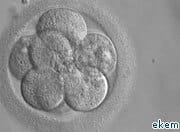A scientific panel has said that controversial techniques to create three and four-parent babies are not “unsafe”, but further tests need to be completed.
In the third review of its kind, experts said “critical” experiments should be carried out to test the techniques, which use IVF to create an embryo with DNA from three people.
The scientific panel was assembled by the Human Fertilisation and Embryology Authority (HFEA), which has already recommended the techniques to the Government.
Straightforward
Doctor Andy Greenfield, who chaired the panel, said safety was “not a straightforward issue”.
He added: “Are these techniques safe in humans? We won’t know that until it’s actually done in humans”.
Earlier this year in the US, members of a committee advising the federal Food and Drug Administration questioned the ethics of the procedures, and said there is not enough preclinical data to show how they can be used safely.
Westminster
If Westminster approves the techniques, the UK will become the only country in the world to legalise the creation of three or four-parent embryos.
Fiona Bruce MP said: “The international community is wholly against these techniques. The UK would be setting a very dangerous precedent in adopting them and isolating itself from the rest of the world.
“Many MPs are gravely worried about the safety of these proposals, the fact that they have not been properly tested, and the very real risk that they could open the door to designer babies”.
Concerns
And Lord Alton of Liverpool said: “Given the safety concerns which have been raised, the unresolved ethical questions, and a practice which runs contrary to international consensus, it would be prudent for the UK to wait at least until these issues have been resolved before being stampeded into a decision which has such far-reaching consequences.”
Earlier this year, the Department of Health launched a consultation on draft regulations for the techniques, which closed in May.
As part of this, the HFEA was asked to reconvene its expert scientific panel to assess the safety and effectiveness of the techniques for the third time, taking into account recent developments.
Baby
The techniques, Maternal Spindle Transfer (MST) and Pro-Nuclear Transfer (PNT), aim to create children free from mitochondrial disease.
MST involves replacing the nucleus in a healthy donor egg with the nucleus DNA from the prospective mother – resulting in a baby with DNA from three parents (a chromosomal mother, an egg mother and a sperm father).
PNT creates a child from four different individuals (a chromosomal mother, a chromosomal father, an egg mother and a sperm father).


